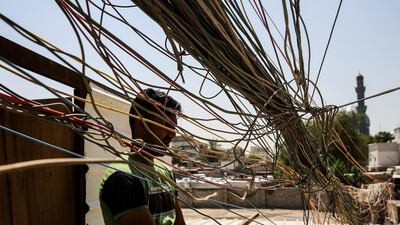German industrial giant Siemens is awaiting "final decision" from the Iraqi government for its 11GW plan to revamp the country’s power sector, according to its regional chief executive.
Siemens, Germany’s largest industrial firm submitted a $15 billion proposal to the Iraqi federal government last year to rehabilitate the country’s dilapidated power infrastructure, following decades of war. Iraq has been courting large multinational energy companies such as Siemens and GE to rebuild its damaged utilities as well as reduce gas flaring, which has led to losses of billions of dollars in lost revenue over the last decade.
Siemens would prioritise "older stations" and work on switching existing stations from "open cycle to combined cycle" to increase efficiency, Dietmar Siersdorfer told The National in an interview in Dubai.
"There is a high energy demand and this is in the range of 11GW. The time and how we do it is the decision of the government,” he added.
The company’s approach would be a “phased one” and priority would also be accorded to wean Iraq from its dependence on electricity imports from its neighbours, noted Mr Siersdorfer.
In an interview with The National earlier this month, Iraq's electricity minister Luay Al Khateeb said his ministry was reviewing the Siemens' proposal "very favourably".
Rival GE had submitted a proposal around the same time last year for a 14GW capacity addition in Iraq. Its proposal however, was overshadowed by suggestions that the US had been pressuring Baghdad to favour its company over Siemens.
Mr Al Khateeb observed that Iraq had “a good and equal and balanced relationship with all countries” but favoured the German proposal for looking at the country’s requirements on a “cross-sector basis” covering transmission, distribution and power generation.
GE's regional president and chief executive said in an interview with The National earlier this month that the company enjoyed "advocacy" support from the US government and said it was interested in pushing for gas flare reduction as well as energy independence for Iraq.
Elsewhere in the region, Siemens is currently working on a number of projects in Bahrain, Kuwait, Qatar and Saudi Arabia, where it is eyeing both conventional and renewables schemes.


